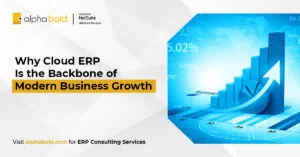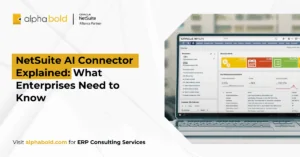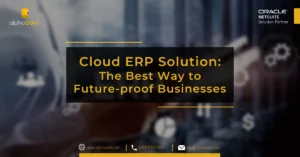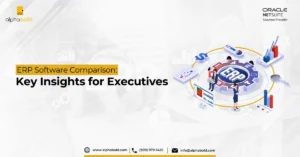Table of Contents
Introduction
The pace of business is faster, leaner, and more interconnected than ever before. Organizations are challenged not only to deliver products and services efficiently but also to adapt to shifting market conditions, regulatory pressures, and evolving customer expectations. Traditional on-premises systems have often struggled to keep up with this rapid change, leaving companies with disconnected tools and limited visibility.
Cloud-based enterprise resource planning (ERP) systems represent a turning point. They bring together finance, operations, supply chain, sales, and customer management under a single, agile platform. The result is a more resilient infrastructure that supports growth while reducing the complexity that has historically hindered companies’ progress.
Why Is a Unified System So Essential?
Running a business on scattered applications often creates friction. Data is siloed, decision-making slows down, and inconsistencies creep into reporting. A unified ERP environment addresses these challenges by centralizing information, giving decision-makers real-time access to accurate metrics.
This interconnected foundation enables leadership to view the complete picture of performance across departments, rather than piecing together fragmented information from different systems. It also sets the stage for more confident scaling, whether through new products, entering new markets, or expanding through acquisitions.
The Core Benefits of Cloud ERP
Organizations that embrace cloud ERP typically see measurable improvements in efficiency and performance. The value extends across multiple areas, including:
- Scalability without disruption: As companies expand, cloud ERP systems scale seamlessly, accommodating new users, business units, and geographies without requiring infrastructure overhauls.
- Cost efficiency: By removing the need for expensive services, maintenance, and upgrades, businesses shift from capital expenditures to predictable subscription models.
- Operational visibility: Real-time dashboards and analytics empower leaders to act on data rather than assumptions.
- Flexibility for remote work: Cloud accessibility enables employees to collaborate securely from anywhere, supporting distributed and hybrid teams.
- Stronger compliance and security: Providers consistently update systems to meet changing regulatory and cybersecurity demands, reducing internal risk.
By consolidating these advantages, cloud ERP becomes a strategic growth engine, not just a back-office utility.
The Role of Agility in Growth
Markets no longer reward companies that rely on slow, reactive processes. Instead, agility defines which organizations outpace competitors. Cloud ERP supports this agility by making it easier to pivot when circumstances change. Whether due to supply chain disruptions, shifting consumer preferences, or economic fluctuations, businesses gain the tools to adjust quickly and effectively.
With centralized data and flexible workflows, decision-makers no longer wait weeks for reports; they receive immediate insights to guide their next moves. This responsiveness is often the difference between capturing an opportunity or falling behind.
Conquer ERP Selection with a Free Checklist
Download now and equip yourself with a structured, step-by-step approach to navigate the ERP implementation process.
Download NowHow Does Cloud ERP Fuel Innovation?
Business growth is not simply about maintaining existing operations more efficiently; it’s also about creating new value. Cloud ERP serves as an enabler of innovation by removing technological roadblocks. Companies that once struggled with outdated legacy systems can reimagine their processes. For example, automated workflows reduce manual data entry, freeing teams to focus on strategy and development. Integrated financial planning tools allow faster modeling of new ventures, while connected customer data supports more personalized service delivery.
Innovation also emerges from the ability to experiment. Because cloud ERP systems are configurable rather than rigid, organizations can pilot new initiatives without lengthy development cycles. This ability to test, refine, and launch initiatives accelerates growth opportunities across industries.
Overcoming Common Objections
Some organizations hesitate to adopt cloud ERP due to perceived risks or challenges. However, many concerns stem from misconceptions. Security worries, for instance, are addressed by enterprise-grade protections that often surpass what a company could maintain independently. Similarly, fears of lengthy implementations are eased by structured deployment models that reduce disruption.
The bigger risk lies in maintaining outdated systems that limit competitiveness. While transitioning to a cloud ERP requires planning and investment, the long-term benefits consistently outweigh the short-term challenges.
Why NetSuite Leads the Way
While there are many cloud ERP platforms, one has consistently distinguished itself as a comprehensive solution for growth-minded companies: NetSuite. With its fully integrated suite covering finance, CRM, eCommerce, inventory, and more, NetSuite delivers the visibility and scalability organizations need to succeed in the dynamic marketplace.
Its global capabilities make it especially valuable for businesses with ambitions beyond local markets, while its flexibility ensures alignment with industries ranging from manufacturing to services. For companies seeking a single backbone to manage their growth, NetSuite offers both stability and adaptability.
Conclusion:
Growth requires the proper foundation, and cloud ERP is that base. NetSuite provides the platform, but realizing its full potential often requires guidance from a trusted partner.
AlphaBOLD specializes in helping businesses harness NetSuite to its fullest, aligning technology with strategy to accelerate growth. From implementation to ongoing optimization, AlphaBold ensures that organizations extract maximum value from their ERP investments.
Ready to strengthen your growth engine?
Contact AlphaBOLD today and discover how NetSuite can become the foundation of your next chapter!
Request a Demo







